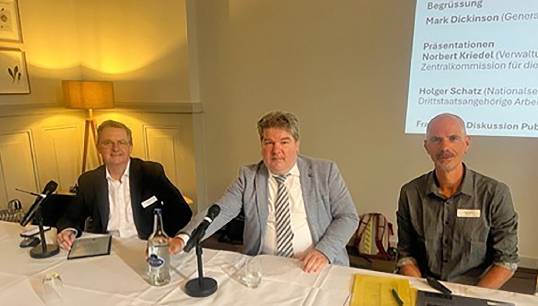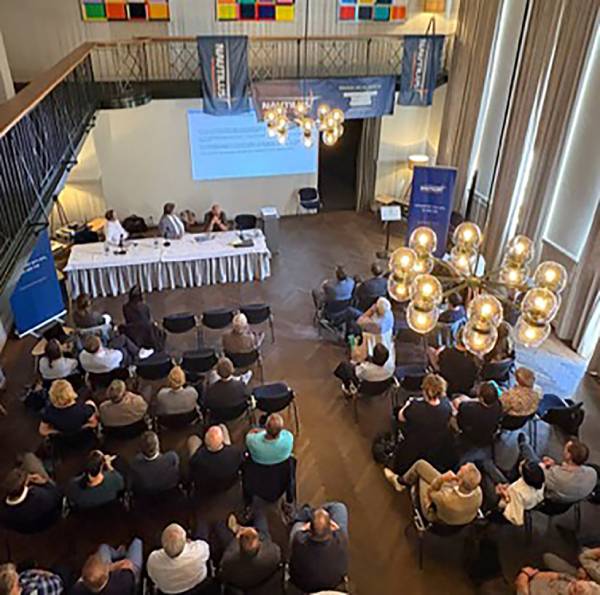- Topics
- Campaigning
- Careers
- Colleges
- Community
- Education and training
- Environment
- Equality
- Federation
- General secretary message
- Government
- Health and safety
- History
- Industrial
- International
- Law
- Members at work
- Nautilus news
- Nautilus partnerships
- Netherlands
- Open days
- Opinion
- Organising
- Podcasts from Nautilus
- Sponsored content
- Switzerland
- Technology
- Ukraine
- United Kingdom
- Welfare
Nautilus seminar in Basel: inland waterway job trends, problems, and opportunities
9 October 2025

The sense of urgency was palpable as shipping professionals from across Europe gathered at the Volkshaus in Basel on 17 September for the annual Nautilus International inland waterways seminar. The inland shipping industry – crucial to Europe’s transport infrastructure – is facing a perfect storm: ageing crews, labour shortages, complex visa rules, and shifting perceptions among younger workers. Holger Schatz, Nautilus International national secretary, reports
As a cross-border trade union representing maritime and shipping professionals in the UK, Netherlands, and Switzerland, Nautilus International uses this annual Swiss seminar event to bring together members, company representatives, and policymakers in inland navigation to debate sector challenges and solutions. This year’s focus was on labour market trends and the impact of restrictive visa rules on river cruise operations.
Navigating the labour landscape
The keynote presentation came from Norbert Kriedel, a member of the Administrative Council for Statistics and Market Observation at the Central Commission for Navigation on the Rhine (CCNR). His analysis confirmed the inland waterways sector is at a crossroads.
While freight transport employment continues to decline slightly, passenger transport – especially river cruising – is expanding. Yet this growth is colliding with an ever-widening labour gap. Mr Kriedel identified several critical trends: an ageing workforce, a shortage of skilled workers, and continued east-west migration within Europe, largely driven by wage disparities.
But beyond statistics, there is a cultural challenge. 'The problem is not only pay,' Mr Kriedel noted. 'It is that young people no longer see inland navigation as a desirable career. The long working hours and shift patterns outweigh the attractions.'
His findings echoed those of the CCNR Labour Market Report 2024, which found that even though inland shipping wages have risen over time, the number of trainees remains worryingly low. Still, Switzerland has seen a modest uptick in training numbers since 2022 – a positive sign amid the broader decline.
Supplementation, not displacement
Addressing the seminar, I outlined the Union’s position on workforce migration – a subject of growing political and industrial concern. In a previous Nautilus article, I asked whether third-country nationals from Asia (including the Philippines, Indonesia, and China) were displacing European workers. The answer, is of course, nuanced.
In Switzerland, inland shipping companies employ about 2,000 nautical personnel and between 10,000 and 11,000 hospitality workers. Among these, some 3,500 hospitality crew and around 200 nautical crew come from non-EU countries and fewer than a quarter hold Swiss visas.
In view of the shortage of skilled workers, this is not about displacement, but supplementation. These workers are filling gaps that cannot otherwise be filled.
The real challenge, I argued, lies in recruitment and retention. Young people's disinterest in maritime careers, driven by lifestyle shifts, means the sector must modernise its image and working conditions – or risk long-term decline.
Training and the path forward
Switzerland is taking steps in the right direction. Since 2022, new qualifications such as the Nautical Specialist EFZ, Captain EFZ, and Bachelor of Science/Dual Degree in Ship and Port Operations have been introduced. Lateral entry into the sector has also been made easier, supported by resources like the SVS Ahoi Captain website, which provides detailed guidance on nautical training and career pathways.
These reforms, however, can only go so far. Training changes are welcome, but without better working conditions and meaningful wage growth, they won’t be enough to make the profession truly attractive again.
Visa restrictions: a chokepoint for Swiss river cruising
Perhaps the most animated discussion of the day centred on visa policy, a 'small aspect' of the agenda that grew into a heated debate. Representatives from the State Secretariat for Migration (SEM) in Bern faced tough questions about Switzerland's restrictive stance on third-country work permits.

Swiss river cruise companies currently require between 2,500 and 3,000 visas for non-EU crew, but the SEM grants only around 800 annually. As a result, many operators have rerouted vessels to avoid Basel altogether, opting to embark passengers at ports in neighbouring France and Germany.
Switzerland’s share of the European river cruise fleet exceeds 30%, yet its own ships are struggling to operate under Swiss regulation. The discrepancy with more flexible visa systems in Germany and the Netherlands has created competitive distortions and prompted some firms to consider relocating.
Industry representatives warned that, without a policy change, Basel could lose its place on the international river cruise map. 'If a practical solution isn’t found very soon,' one attendee said, 'Basel will disappear from the itineraries altogether.'
Nautilus: controlled, fair, and enforceable visas
At the seminar, Nautilus called for a pragmatic solution that balances control with flexibility. We argued that a Swiss employment contract combined with a Schengen visa would ensure that social security and wage standards are upheld, working hours are monitored, and labour conditions remain transparent.
This is in the interests of both companies and employees. When workers are forced into informal arrangements through foreign jurisdictions, true oversight – and fair treatment – becomes impossible.
Signs of progress
In closing, Philipp Berger of the SEM offered a note of optimism. Talks are underway between authorities, the IG RiverCruise association, and the industry, with a new framework expected before year end. 'We are aware of the problem,' he said, 'and a practicable solution is imminent.'
As Europe's inland waterways face a period of transformation, collaboration between unions, companies, and regulators will be essential. For Nautilus International, the message from Basel was clear: the sector's future depends not just on finding enough workers, but on ensuring they have fair conditions, proper training, and a reason to stay afloat.
Tags
